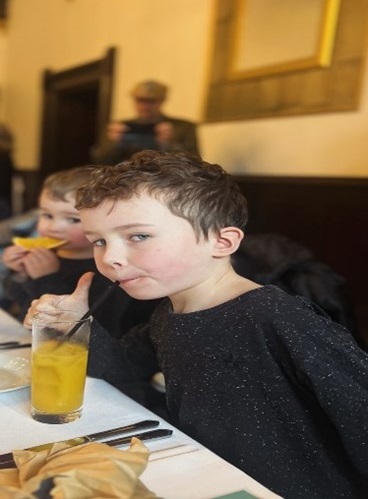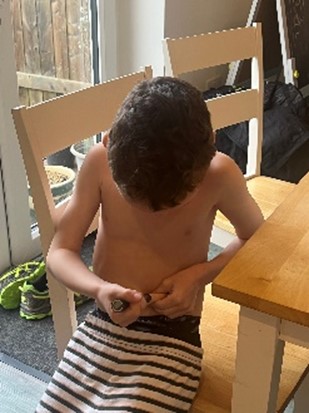Mum Lisa says:
“We were relieved to have caught Jacks Type 1 diagnosis when we did and prevented a hospital admission for him. We need a Registry to help understand better about how T1D progresses and to recruit individuals into trials to get a cure for T1D!”

Jack was 5 years old, he started primary school in September 2021. In November 2021 we noticed that he appeared extremely tired and was having a few wee accidents at night and in the day after being dry for 1 year +. We thought, “he's just started school so he's likely just tired from all the playing and learning”. I am aware of the symptoms of T1D and I have type 1 diabetes myself (I was diagnosed aged 8), my Dad also had T1D (he was diagnosed aged 2) so I wanted to get Jack checked.
I took him to the GP at the end of November 2021 and they did a HbA1c which came back normal. I felt relieved - maybe I was worrying for nothing??
Fast forward 8 or so months later, Jack had started complaining of tummy ache on and off and was still very tired and lethargic. Jack was seen by an out of hours GP and they ruled out constipation and sent a urine sample off to rule out a UTI which came back normal.
I managed to convince Jack to let me check his glucose on my capillary blood glucose meter that evening before his evening meal and it was 10.2 mmol/L. We washed his hands again and re-checked it and was 10.6 mmol/L (which is not normal!).
Jack allowed me to put one of my Freestyle Libre 2 sensors on his arm the next day and his glucose 2 hrs after lunch was 13.2 mmol/L. He was seen at our local hospital that evening, his glucose had come down to 8.9 mmol/L by the time we got there. Jack stayed overnight for monitoring and his glucose had come back down into single figures overnight, his fasting venous glucose was 3.3 mmol/L. He also had his autoantibody bloods and his Hba1c taken (HbA1c hadn’t changed from 2021 - it was still 35 mmol/mol).
We got Jack's autoantibody results back a month or so later and he had three strong positives (to GAD, IA2 and ZnT8).
I didn't want to test Jacks blood glucose levels too often as I didn't want him to resent having diabetes but when I did check his glucose it would often rise to 12-15mmol/L within 2 hours of eating and would then return to normal.
We were referred to the Oxford Pre-T1D clinic and Jack had 6 monthly HbA1c to monitor any progression, 3 monthly 2 hr post prandial home glucose testing and advised us to test his fingerprick glucose at times of illness. Jack also had his autoantibody tests retaken and they remained strongly positive. It was nice to know that Jack was being reviewed and there was some kind of plan in place and that made us feel a lot better.
Jack unfortunately became unwell at the end of March 2024 with fever and a rash, his younger brother had also seen Jack drinking from the tap in the bathroom. We followed the team's advice and tested Jack's blood glucose and they were really high. We got in touch with the diabetes team and Jack was then started on low doses of insulin.

We were relieved to have caught Jacks Type 1 diagnosis when we did and prevented a hospital admission for him. His diagnosis almost felt like a ticking time bomb - not a matter of if but when it would happen. Of course, we didn't want Jack to get Type 1 Diabetes but we also didn't want him to end up very poorly in DKA. They say knowledge is power however knowing that your child has positive antibodies but not knowing when the diagnosis will happen is hard - it could be months or could be years! Having a plan definitely helped us and knowing we had support/follow up was amazing.
Since he has started insulin family/friends/school staff have mentioned how much more energy Jack has. He is our little super star and has been so brave and resilient ⭐️.
There are so many reasons! Here are a few: